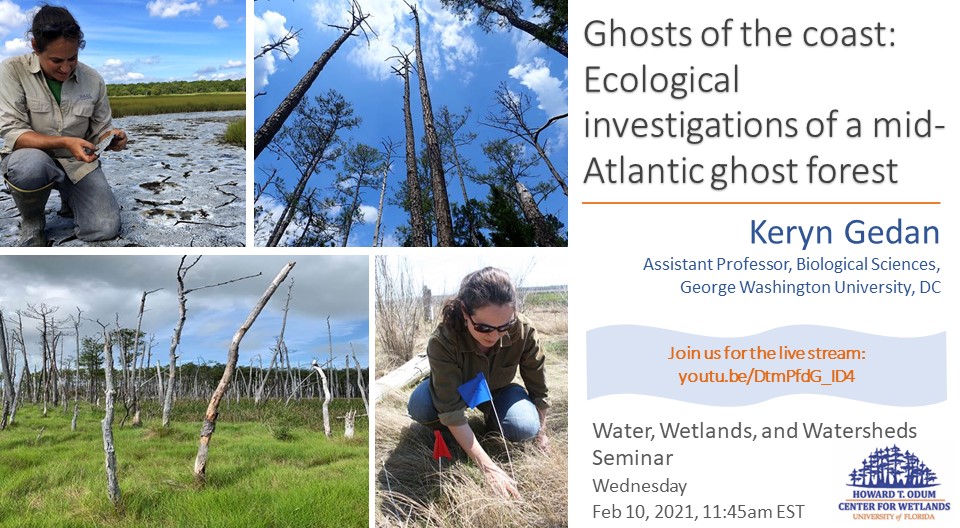February 10, 2021
Ghosts of the coast: Ecological investigations of a mid-Atlantic ghost forest
Keryn Gedan, Assistant Professor, Biological Sciences, George Washington University, DC
Join us for the live stream Feb 10, 11:45am EST (note, there will not be a public recording for this seminar): youtu.be/DtmPfdG_ID4
Abstract
Ghost forests are formed when sea level rise and saltwater intrusion kill trees at the coastal interface. While the formation of ghost forests reduces coastal forest habitat, it also offers an opportunity for expansion of intertidal ecosystems such as tidal marshes, which are rapidly losing habitat due to sea level rise-related drowning and edge erosion. The Mid-Atlantic is a hot spot of sea level rise and provides a window through which to view the future of coastal change. In forest plots spanning a salinity stress gradient at the Virginia Coast Reserve Long-Term Ecological Research site, vegetation monitoring and observational data paint a picture of the pace and nature of ghost forest formation. Canopy, subcanopy, and understory vegetation are rapidly changing as the forest converts to marsh; in only two years of observations, patterns have begun to emerge, including a rapid increase in the shrub layer, as well as in the cover of the invasive common reed, Phragmites australis. Using several methods, we estimate a rapid pace of change that may convert our forested study site to marsh in as little as a quarter-century.
Bio
Dr. Keryn Gedan is an Assistant Professor in Biological Sciences at George Washington University. She received her bachelor’s degree from Tufts University in Biology and Environmental Studies and her PhD from Brown University in Ecology and Evolutionary Biology. Gedan is a coastal ecologist who researches global change factors such as sea level rise, climate change, hypoxia, and invasive species. Her current research investigates the response of tidal marsh and nearshore upland ecosystems to accelerated sea level rise. Gedan and her students have projects in coastal marsh, forest, and salt-affected farmland in the Chesapeake Bay and Mid-Atlantic seashore, where they work with farmers and land managers to inform conservation and restoration activities. Her research is supported by NSF, Maryland Sea Grant, the USDA, and the National Fish and Wildlife Federation.
Seminar postcard

